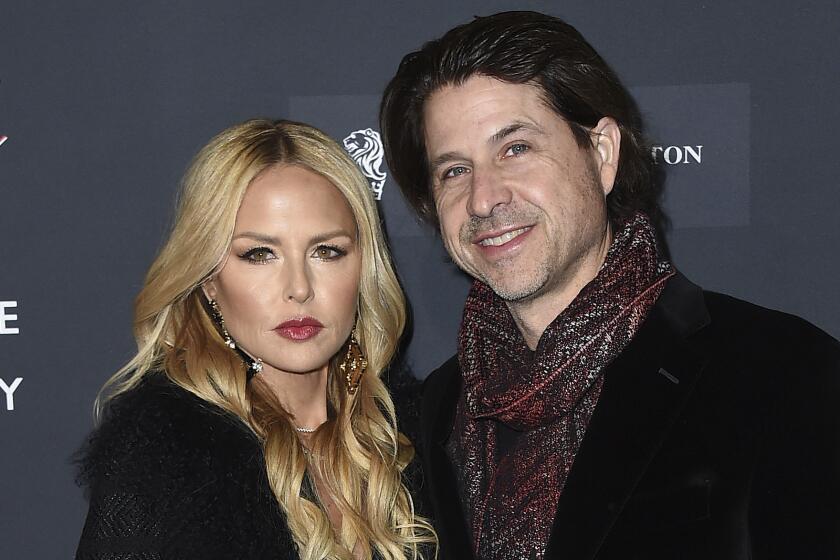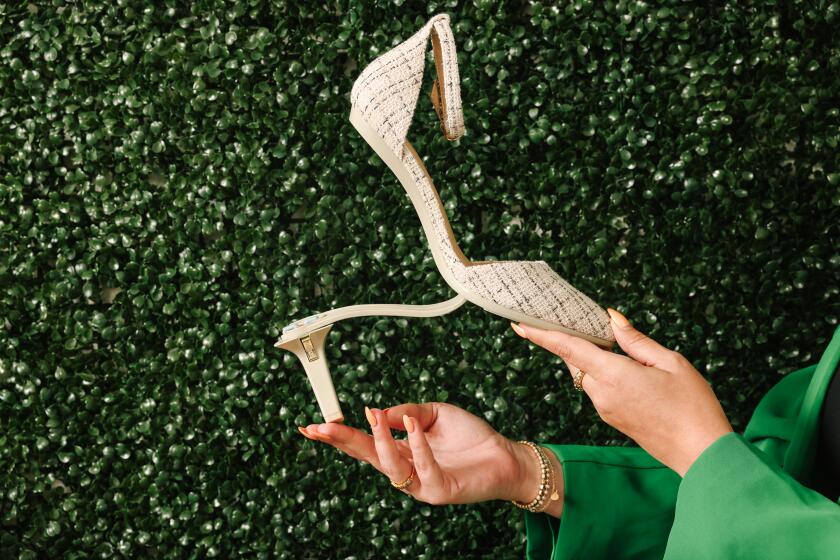Adidas Steps Up to Buy Reebok for $3.8 Billion
Adidas-Salomon’s proposed $3.8-billion purchase of Reebok International Ltd. could dramatically reshape the global athletic shoe and apparel industry, creating a more formidable competitor to industry giant Nike Inc. and putting more pressure on a host of much smaller manufacturers.
The proposed combination, which the companies announced early Wednesday, would allow Adidas and Reebok to build on their respective strengths, industry analysts said. Adidas, based in Germany, is dominant in Europe and Asia, is big in soccer and is known for its shoe technology; fashion-savvy Reebok, based in Massachusetts, is popular in all the major U.S. sports and has long sought to grow overseas.
For the record:
12:00 a.m. Aug. 5, 2005 For The Record
Los Angeles Times Friday August 05, 2005 Home Edition Main News Part A Page 2 National Desk 1 inches; 32 words Type of Material: Correction
Adidas-Reebok deal -- A chart in Thursday’s Business section with an article about Adidas-Salomon’s proposed acquisition of Reebok International gave Adidas’ 2004 sales as $7.06 trillion. It should have said $7.06 billion.
By scooping up Reebok for $59 a share, Adidas would more than double its sales in the U.S., which accounts for 44% of the $20.4-billion branded athletic shoe market worldwide, according to Sporting Goods Intelligence Inc., a Glen Mills, Pa., research firm. Together, the two companies would have more clout in dealing with retailers such as Foot Locker Inc. and Sports Authority Inc.
“The message from this deal is ‘Get big or get out,’ ” said Peter Sealey, a UC Berkeley marketing professor and a former Coca-Cola Co. executive.
Together, No. 2 Adidas and No. 3 Reebok would have a global market share of 25%, narrowing the gap with Nike, which has a 33.2% share, according to Sporting Goods Intelligence.
Adidas and Reebok said they planned to maintain their separate brands and their current rosters of products, which include athletic shoes, apparel and sports equipment.
Investors cheered the news. Reebok shares rose $13.19, or 30%, to $57.14 on Wednesday. Adidas’ shares in Germany rose nearly 7%. Nike shares rose $1.09 to $86.92.
Industry analysts said Wednesday’s deal meant that other shoes were likely to drop, meaning that more buyouts might lie ahead.
“This is an industry that’s consolidating at a very rapid clip, and we think you’re going to see a lot more of this happening,” said John Shanley, an analyst with Susquehanna Financial.
James S. Davis, chief executive of New Balance Athletic Shoe Inc., currently the fifth-largest shoe company by market share, agreed.
“What this really says to me is that consolidation will continue to take place at both the retailer and supplier level,” he said in a statement. In a reference to his company’s future, Davis said that “New Balance’s goal has always been to be the best, not the biggest.”
Smaller manufacturers such as Puma and New Balance may have to adjust their products, pricing and marketing strategies to remain relevant.
“This changes the dynamic for the smaller guy more so than for the bigger guy,” said Marshal Cohen, industry analyst for market research firm NPD Group. “Now they’re going to have to step up to even be in the race at all.”
Reebok, for example, has been making strides in the urban market -- a niche where Westlake Village-based K-Swiss Inc. has been gaining ground -- by developing signature footwear for rappers Jay-Z and 50 Cent. K-Swiss Chief Executive Steven Nichols could not be reached for comment Wednesday.
As the industry shrinks, niche players will have to be strong to survive, said Richard J. Heckmann, chairman of Carlsbad, Calif.-based sporting goods company K2 Inc., which makes Adio shoes for skateboarders.
Small, core brands that seek out shelf space in board shops and other specialty retailers could continue to thrive, he said. “If we tried to take our Adio brand into Foot Locker, Nike and Adidas would murder us,” Heckmann said. “And every time that Nike or Reebok tries to come into skate, we murder them.”
Adidas’ increased global presence with Reebok in its fold could make it easier for the combined companies to sign the hottest athletes, said Jonathan Chajet, director of brand strategy for Siegel & Gale, a brand consulting firm.
Adidas-Reebok would have a strong presence on professional athletic fields around the world. Reebok outfits professional football, basketball, baseball and hockey teams and Adidas provides apparel and shoes for World Cup soccer, the Olympic Games and European soccer leagues.
The two companies also outfit basketball stars such as Allen Iverson and Yao Ming, along with soccer star David Beckham. That lineup would go head to head with Nike’s roster, which includes basketball’s Kobe Bryant, LeBron James and Carmelo Anthony.
The deal also could accelerate the trend of shoe and apparel endorsements being reserved only for the best-known athletes, said Perry Rogers, who represents Andre Agassi, the tennis player who recently dropped Nike for Adidas.
“There’s not going to be as much competition for mid-level athletes because these big companies can afford to be more selective about who they want,” Rogers said.
Adidas also will be able to use its foreign stars to better advantage in the U.S. and give its Reebok endorsers broader exposure in the rest of the world.
The U.S. athletic shoe industry has seen sales increase slightly in recent years, but the average price of a pair of shoes fell 1.6% last year as consumers demanded better value, according to SGMA Inc., a North Palm Beach, Fla.-based industry trade group.
Adidas-Salomon CEO Herbert Hainer said the proposed acquisition represented “a major strategic milestone” for his company, which intends to expand its geographic reach while creating shoes, clothes and goods for a wider range of consumers.
Cost savings would be wrung from manufacturing, distribution and marketing operations, trimming $150 million in annual costs within three years of the deal’s completion, he said.
Reebok CEO Paul Fireman described Adidas as “the perfect strategic partner.” Fireman and his wife, Phyllis, own 17% of Reebok and together stand to gross more than $790 million if the sale goes through.
Reebok spokeswoman Denise Kaigler said talks between Hainer and Fireman about combining their companies began during last year’s Olympics in Athens.
Adidas would maintain its corporate headquarters in Herzogenaurach, Germany, and its North American headquarters in Portland, Ore. Reebok would keep its name and headquarters in Canton, and Paul Fireman would remain as chief executive.
Company executives said they did not anticipate “significant workforce reductions.” The deal, which is expected to close early next year, was approved by the boards of both companies but still must be cleared by shareholders and regulatory agencies.
*
(BEGIN TEXT OF INFOBOX)
The companies
--
Adidas
Founded: 1949
Headquarters: Herzogenaurach, Germany
Major brands: Adidas and TaylorMade-Adidas Golf
2004 Adidas sales: $7.06 trillion
2004 Salomon sales: $890 million*
2004 TaylorMade-Adidas sales: $863 million
Employees: 14,217
--
Reebok International
Founded: 1958 in Britain
Headquarters: Canton, Mass.
Major brands: Reebok, Rockport, CCM, Jofa, Koho, Greg Norman
2004 footwear sales: $2.43 billion
2004 apparel sales: $1.35 billion
Employees: 9,102
--
Athletic footwear market share
Based on 2004 global wholesale sales
Nike: 33.2%
Adidas: 15.4%
Reebok: 9.6%
Puma: 6.8%
New Balance: 6.6%
*In May Adidas announced it was selling its Salomon division. The sale is expected to be completed by Oct. 1.
Sources: Company reports, Sporting Goods Intelligence
More to Read
Inside the business of entertainment
The Wide Shot brings you news, analysis and insights on everything from streaming wars to production — and what it all means for the future.
You may occasionally receive promotional content from the Los Angeles Times.










